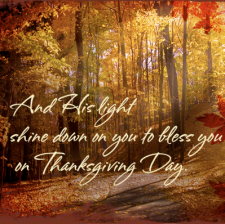 Thanksgiving is an American holiday that stretches all the way back to a time long before America became a nation. The Pilgrims landed in 1620. They faced brutal conditions and were woefully unprepared. Roughly half of them died in that first year. Then they had a successful harvest of corn. In November of 1621 they decided to celebrate a feast of thanksgiving.
Thanksgiving is an American holiday that stretches all the way back to a time long before America became a nation. The Pilgrims landed in 1620. They faced brutal conditions and were woefully unprepared. Roughly half of them died in that first year. Then they had a successful harvest of corn. In November of 1621 they decided to celebrate a feast of thanksgiving.
Edward Winslow was among those who ate that first thanksgiving meal in 1621. He noted:
“Our harvest being gotten in, our governor sent four men on fowling, that so we might after a special manner rejoice together after we gathered the fruit of our labors. …And although it be not always so plentiful as it was at this time with us, yet by the goodness of God, we are so far from want.”
In addition to the fowl eaten that first Thanksgiving, the Indians also brought along five deer as their contribution to the feast. Presumably they also ate corn.
Over the centuries, Americans continued to celebrate feasts of thanksgiving in the fall. Some presidents issued proclamations. Abraham Lincoln issued a proclamation for a perpetual national holiday set aside for thanksgiving. In 1863, with the nation torn apart by the Civil War, he declared:
“I do therefore invite my fellow citizens in every part of the United States, and also those who are at sea and those who are sojourning in foreign lands, to set apart and observe the last Thursday of November next, as a day of Thanksgiving and Praise to our beneficent Father who dwelleth in the Heavens.”
So we have a holiday of thanksgiving born in and further nurtured during times of great adversity and struggle. We might think that times of adversity and challenge would spawn ingratitude, while times of prosperity would spawn gratitude. Sadly, the reverse is true. A chilling scene from the animated television show The Simpsons demonstrates this. Bart Simpson was called upon to pray for a meal, to which he promptly prayed, “Dear God, We paid for all of this stuff ourselves, so thanks for nothing.”